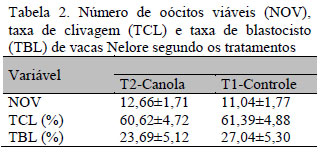It was evaluated the production of oocytes and embryos from Nellore cows in vitro, as well as its resistance to vitrification, when the animals were supplemented with canola grains. Twelve Nellore cows were randomly divided into two treatments: T1-treated with Canola grains (2.0kg/animal/day) and T2-control. Each animal was submitted to other four aspirations, to obtain oocytes for the in vitro fertilization. The oocytes were quantified and classified as viable or not viable. The embryos were cultivated in vitro, seven days after the quality and the level of development of embryos was evaluated and they were vitrified in vitrification straws. Then, the embryos were thawed and grown during 6, 12 and 24 hours, and the rate of expansion and hatching were recorded. There were no differences (P> 0.05) in the whole number of viable oocytes T1: 12.7±1.71 and T2: 11.0±1.77, cleavage rate T1= 60.6±4,72 and T2= 61.4±4.88 or blastocysts rate T1=23,7±5.12 and T2=27,0±5.30 due to the treatment. The treatments did not influence the rate of re-expansion T1= 70,5±6.99 and T2: 59.6±7.09 after vitrification and thawing. However, there was a significant difference (P <0.06) in the hatching rate (T1: 69.17±7.43; T2: 35.66±6.86). Thus, we conclude that supplementation with canola grains did not change embryos production, but the embryos yielded from oocytes of cows fed canola grains are more resistant to vitrification.
Nelore; omega 6; omega 9; cryopreservation; embryo



